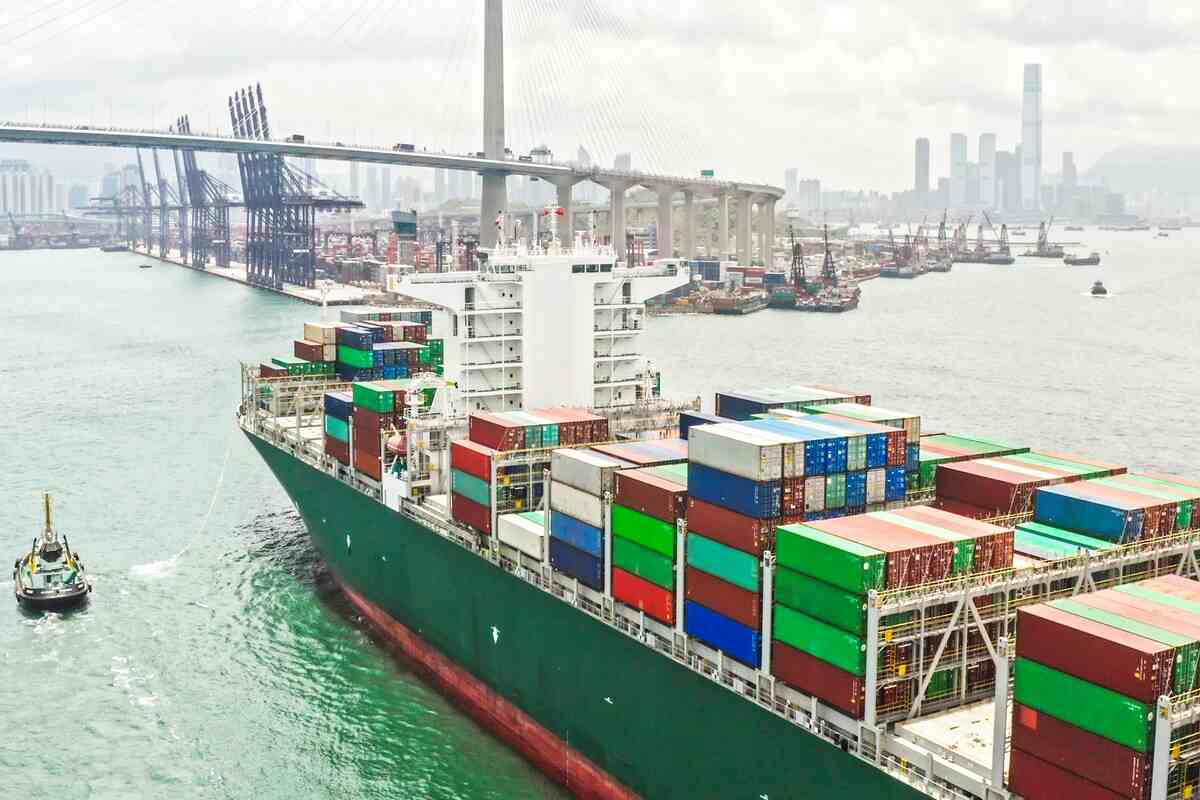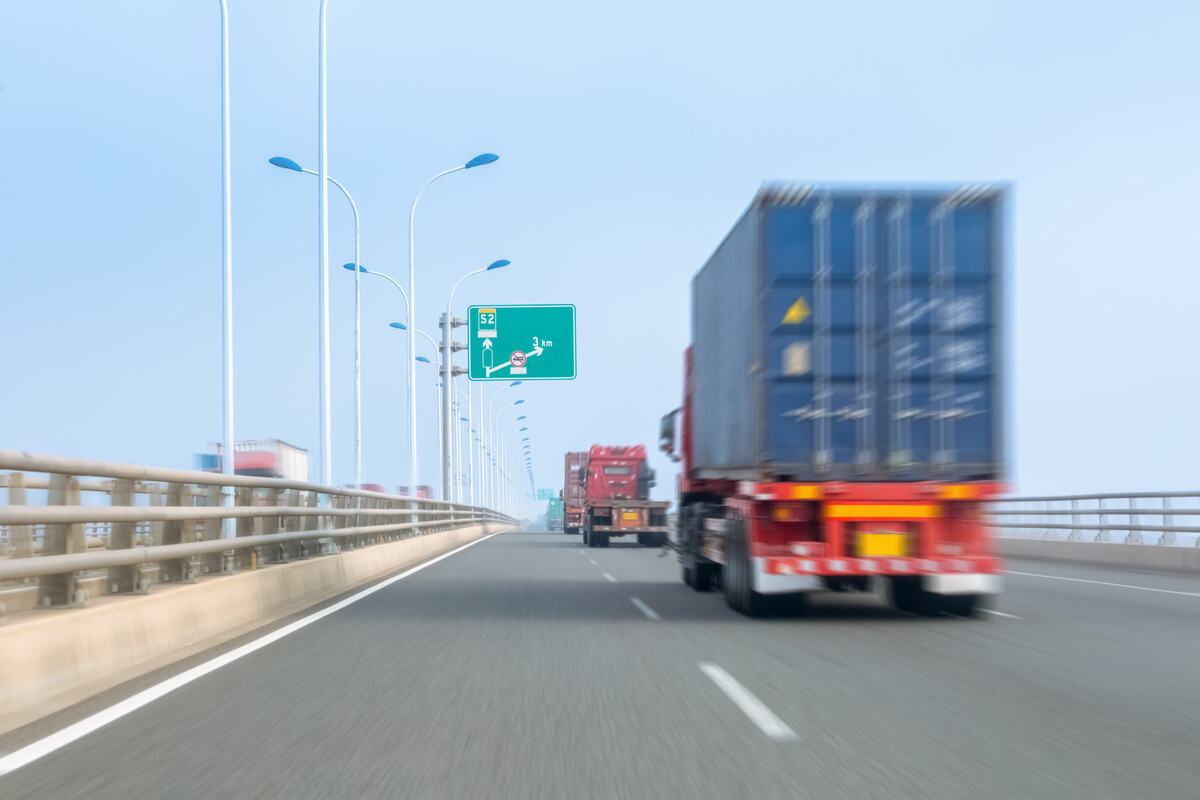The Advantages of Intermodal Transportation in Logistics

Intermodal transportation is reshaping the logistics landscape, providing a versatile and efficient solution for businesses navigating the complexities of modern supply chains. By integrating various modes such as truck, rail, ship, and air, intermodal freight transportation offers a multifaceted approach to addressing key challenges while also contributing to environmental sustainability.
In this article, we will dive into its advantages, cost-saving potential, and the role it plays in enhancing supply chain visibility.
Understanding Intermodal Transportation
Intermodal transportation is a method of moving goods using different types of transportation, like trucks, trains, and ships, all seamlessly connected. It allows for efficient and flexible shipping by smoothly transferring cargo between various modes of transport. Standardized intermodal containers play a pivotal role, streamlining cargo handling processes and making the entire system more versatile.
Intermodal containers are metal boxes of the same size used to transport goods on ships, trains, and trucks. Their consistent design makes it easy to move them between different types of transportation, simplifying the shipping and logistics process globally. Over time, intermodal transportation has evolved into a cornerstone of modern logistics, offering a dynamic and integrated approach to moving goods.
Advantages of Intermodal Transportation in Logistics

Why has this method of transportation become a cornerstone of modern logistics? Let's explore the most important advantages of intermodal transportation.
1. Cost Effectiveness
Cost efficiency is a core advantage of intermodal transportation, achieved through streamlined operations and standardized containers. By reducing shipments and optimizing routes, businesses can decrease the need for extra packaging and overall transportation expenses. The method's focus on economies of scale, especially when transporting large volumes of goods, enhances overall cost-effectiveness, making intermodal transportation a financially mindful choice for businesses seeking to optimize their logistics expenses.
2. Environmental Benefits
Intermodal transportation stands out for its notable environmental advantages. By moving significant cargo volumes with minimal fuel consumption per unit, the method inherently reduces carbon emissions, contributing to a greener supply chain. The use of standardized containers minimizes the need for additional packaging materials, further lessening environmental impact.
As businesses prioritize sustainability, intermodal transportation emerges as an eco-friendly solution, aligning with global efforts to reduce the environmental footprint of logistics operations. The fuel efficiency of intermodal transportation is key in enabling a more environmentally mindful approach to moving goods.
3. Enhanced Flexibility
Intermodal transportation provides businesses with enhanced flexibility in their logistics strategies. This adaptability allows companies to seamlessly adjust transportation plans in response to dynamic factors such as fluctuating demand, unexpected supply chain disruptions, or changing market conditions.
With the ability to switch between different transportation modes effortlessly, businesses can maintain agility and responsiveness. This flexibility is a key asset, ensuring that logistics operations remain adaptable to the evolving needs and challenges of the market, ultimately supporting the efficient movement of goods.
4. Improved Reliability
Intermodal transportation enhances reliability by incorporating measures to address potential disruptions. For instance, in the face of traffic congestion, a common challenge in road trucking, intermodal logistics can seamlessly shift to rail transport, mitigating delays and ensuring the timely movement of goods.
Similarly, when faced with driver shortages, a persistent issue in the trucking industry, intermodal solutions provide an alternative mode of transportation, maintaining a consistent and reliable supply chain. These reliability measures are crucial for businesses to uphold delivery timelines and navigate unforeseen challenges in the logistics landscape.
5. Speed and Time Savings

Intermodal transportation strategically combines different modes to achieve faster transit times. Rail transport, efficient for long distances, complements the strengths of truck transportation in final-mile delivery. This synergy minimizes overall shipping durations, enhancing the speed and efficiency of the entire logistics process.
Businesses gain a competitive edge and meet customer expectations by leveraging the distinct strengths of each transportation mode, resulting in faster deliveries. The streamlined shipping processes contribute to improved overall efficiency in the timely movement of goods throughout the supply chain.
6. Scalability and Capacity
Intermodal transportation offers businesses the advantage of scalable solutions to efficiently handle varying cargo volumes. During peak seasons, intermodal transportation allows the company to scale up its operations, efficiently transporting increased volumes of goods.
Conversely, during slower periods, the business can adjust transportation needs accordingly, avoiding unnecessary costs. For example, a retail company experiencing seasonal fluctuations in demand can seamlessly adapt its shipping strategies.
This scalability ensures that companies can flexibly respond to changing market conditions while maintaining consistent capacity, optimizing resources, and achieving cost-effective logistics operations.
Challenges and Considerations of Intermodal Transportation
While intermodal transportation offers numerous advantages, it is not without challenges. These challenges may include:
- Highway Congestion: Increased traffic on highways may result in congestion, affecting the efficiency of road trucking segments in intermodal transportation. This challenge can lead to delays and potentially impact overall transit times.
- Security Concerns at Terminals: Terminals, which are critical transfer points in the intermodal network, face security challenges. Vigilant measures are necessary to safeguard cargo during transfers, minimizing the risk of theft or damage.
- Tracking Capabilities in the Supply Chain: In intermodal transportation, where goods traverse different modes, businesses need clear and real-time tracking capabilities. This means having the necessary technology and systems in place to achieve optimal transparency. Some companies may still not have these technologies in place.
While these challenges exist, with ongoing advancements in technology and careful planning, businesses can find ways to tackle these challenges successfully. For example, the use of smart traffic management systems helps monitor and avoid congested highways in real-time.
Similarly, implementing advanced security measures like RFID tracking improves cargo protection at transfer points. These practical solutions contribute to building a dependable and robust intermodal transportation system.
Future Trends and Innovations in Intermodal Transportation
As intermodal transportation continues to evolve, future trends and innovations promise to enhance its efficiency and sustainability further.
Integration of AI and Data Analytics
The future of intermodal transportation lies in using the power of artificial intelligence and data analytics. This integration will revolutionize supply chain visibility, providing real-time insights into cargo movement. AI algorithms will enable predictive analytics, empowering businesses to make proactive decisions, optimize route planning, and minimize disruptions for a more responsive logistics network.
Predictive Analytics for Proactive Decision-Making
The adoption of predictive analytics in intermodal transportation will empower logistics providers to anticipate challenges and make informed decisions in advance.
By analyzing historical data and current trends, logistics providers can optimize route planning, reduce delays, and enhance overall operational efficiency, ensuring a more proactive and resilient supply chain.
Advancements in Eco-Friendly Technologies
The future of intermodal transportation includes a shift towards eco-friendly technologies, such as electric and autonomous vehicles. This transition aims to reduce the environmental impact of logistics operations further. Electric vehicles minimize carbon emissions, contributing to cleaner air, while autonomous technologies enhance efficiency and safety in cargo movement, aligning with sustainable practices in the transportation industry.
These future trends collectively shape the trajectory of intermodal transportation, leading us into the era of advanced technology, enhanced efficiency, and a commitment to environmental sustainability.
The Evolving Landscape of Intermodal Transportation: Final Words
In summary, intermodal transportation brings cost efficiency, sustainability, and adaptability to the logistics sector. Challenges like road congestion and security are being addressed with ongoing advancements. The future looks promising as artificial intelligence, predictive analytics, and eco-friendly technologies transform intermodal logistics. Embracing these innovations ensures a resilient, technologically advanced, and eco-conscious future for transportation and supply chain operations.
Looking for a Trustworthy Shipping Partner?
At UNIVAL Logistics, we embrace technological advancements by combining dependable methods with the latest tech solutions. Our focus is on safely transporting and insuring high-value goods, so you can always be sure you'll get compensation in case of unexpected events.
All our vehicles are equipped with real-time tracking, making it simple to secure insurance coverage for your packages at competitive rates. Additionally, we offer smooth integration with your website through UNIVAL's API, ensuring hassle-free last-mile deliveries. Count on us to ensure your packages reach their final destinations on time.
If you want to know more about our service, feel free to get in touch with us.
Latest blogs
Dimensional (DIM) Weight in Shipping: What It Is & How It’s Calculated
Wed, Jan 14th 2026, 07:11
 Continue Reading →
Continue Reading →
The Rise of Online Luxury Sales and What It Means for Jeweler
Wed, Nov 19th 2025, 02:32
 Continue Reading →
Continue Reading →
Categories
default